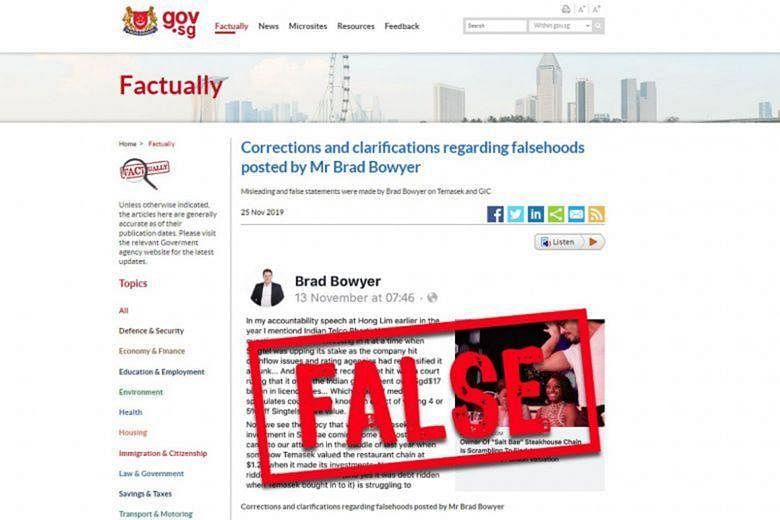The recent use of Singapore's fake news law to correct a Facebook post by Progress Singapore Party (PSP) member Brad Bowyer does not affect his rights to free speech, said the Ministry of Law (MinLaw) and Ministry of Communications and Information (MCI) yesterday.
Their joint statement comes amid scrutiny over the use of the Protection from Online Falsehoods and Manipulation Act (Pofma), which has attracted media attention across the world.
Critics have raised the spectre of the law being used to squelch dissent after it was invoked twice in recent weeks, but some others have pointed out that in both instances, the original posts that were corrected have not been removed.
This was pointed out by MCI and MinLaw, which said in a statement posted on Facebook that Mr Bowyer's original Facebook post remains available for anyone to read.
After he was required to put up a correction alongside his post, he went on to issue repeated clarifications in further posts, the ministries added.
"Requiring a factual statement to be posted in order to correct a false statement does not curtail anyone's free speech," they said.
Their statement was sparked by PSP's criticism that the law falls short of the values of transparency, independence and accountability, after it was used on Mr Bowyer.
On Nov 25, he became the first person to get a correction direction under Pofma for a Facebook post about investments by GIC, Temasek and other government-linked companies.
He had to put up a note on his post as well as link it to the correct facts on the Government's fact-checking site Factually. He complied on the same day.
In the other incident, the owner of the States Times Review Facebook page did not comply and Facebook was issued a direction to put up a correction on his post.
Facebook complied.
On Tuesday, the PSP, responding to Mr Bowyer's incident for the first time, said a minister has the power to declare something as false without any "justification, criteria or standards".
"This does not measure up to the standards of transparency and accountability. And where the news involves the Government, it also fails the standard of independence," the party added.
Rebutting this, MCI and MinLaw said the law explicitly requires ministers to state why the specified statements are false and there are legal precedents on how falsehoods should be determined.
The ministries added that the law also states clearly it can be used only when clear criteria are met: If there is a false statement of fact and it affects the public interest.
"When Pofma was used recently, the reasons why the statements were false were explained clearly. Significantly, PSP and Mr Brad Bowyer do not deny that his post contained falsehoods," they noted.
They also said a minister's decision can be challenged in court "at minimal cost", setting "a high standard of accountability".
The PSP had also said that while it agrees the Government needs to be able to act swiftly to prevent fake news from going viral, it is the courts that should decide what is false and what penalties to impose for independence.
"The courts would also have an established system and precedents of determining falsehood from its handling of cases like fraud, thereby ensuring transparency and accountability," the party said.
MCI and MinLaw replied that it was untrue that ministers can impose any penalties they wish.
If a minister's direction is not complied with, only the courts can impose penalties after due process is followed and in accordance with established legal principles, the ministries added.
They also took issue with a picture in the PSP post that depicted people's mouths being taped shut.
Noting that Mr Bowyer's post remains online, the ministries said: "Readers can make up their own minds as to what is the truth.
"How has Mr Bowyer's mouth been taped? His original post remains available for anyone to read. His rights to free speech remain unaffected."
Separately, the Finance Ministry responded yesterday to a Forum letter on The Straits Times website on Monday, to explain the distinction between fact and opinion.
Letter writer Avantika Narayan said some of Mr Bowyer's claims seemed more like opinion than fact, like the recently scrapped Amaravati City project between India and Singapore.
The ministry's director of reserves & investment Lim Zhi Jian said Mr Bowyer had made several false assertions, including that a substantial part of $4 billion had been poured into the project.
Mr Lim added: "Pofma was not used against Mr Bowyer's opinion on the performance of the specific investments. Mr Bowyer is entitled to his opinion.
"But the Government has to clarify Mr Bowyer's false statements of fact, which he used to build a misleading narrative about our reserves to discredit the Government and smear the reputations of Temasek and GIC."
SEE FORUM: Pofma case: Brad Bowyer's Facebook post contained several factual falsehoods


